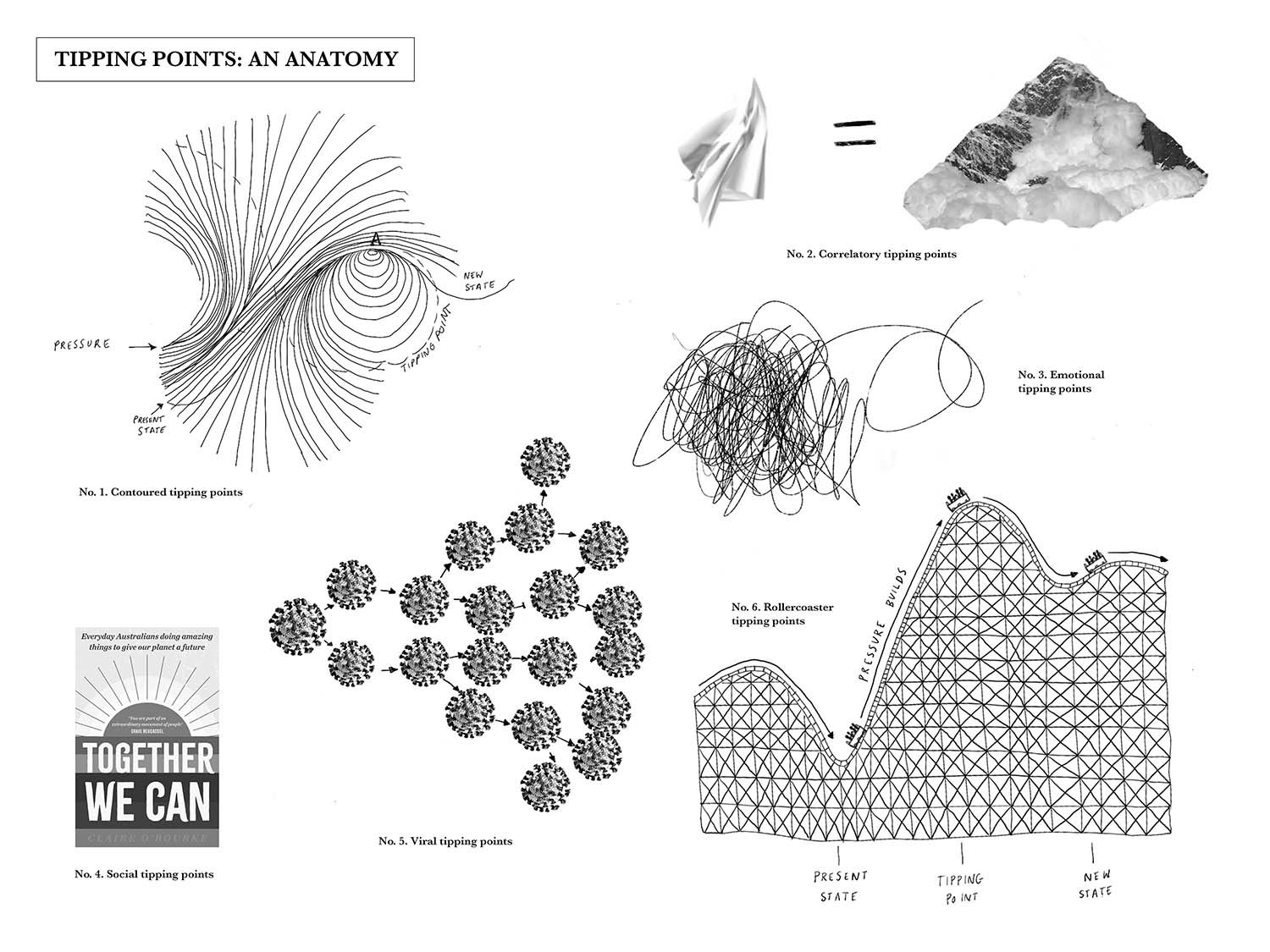Tipping in the right direction
When it comes to climate change, a tipping point is something many of us are used to hearing in the same sentence as thawing permafrost and coral reef die off. It’s scary stuff, but tipping points aren’t all bad. So, how can we add momentum to the conditions that help deliver the positive kind?
Claire O’Rourke’s book ‘Together We Can’ has been described as chicken soup for the soul for those freaked out about climate change and after reading it we couldn’t agree more. One big, nourishing noodle in this book comes from Will Steffen who says “I am optimistic because we know that society can create tipping points.”
When someone like Steffen says this, it means something. He’s one of the world’s most distinguished climate scientists and has spent his career specialising in carbon cycles, tipping points and complex systems theory. So how do tipping points work and why are they something to get excited about?
When it comes to climate change, a tipping point is something many of us are used to hearing in the same sentence as thawing permafrost and coral reef die off. All big, scary stuff. But a tipping point is neither positive or negative. It’s when a relatively small thing happens that triggers a shift in the dynamics of a system, changing it from one state to another.
When Steffen talks about them in O'Rourke's book, he’s talking about social transformation that leads to quick and impactful change. They are the leavers we can pull to deliver the ultimate bang for our buck when it comes to our efforts to accelerate climate solutions.
And here's the thing about tipping points – it’s almost impossible to predict when, where or how they might happen. As O’Rourke points out, they often arrive when we least expect them to, but we can sometimes spot when conditions are shifting that might lead to one.
Take this year’s federal election. Over the last few years many environmental, social, political and emotional facts about climate change built up, and when given an avenue to do something, the Australian public voted in droves for more action.
While a new government might have looked like a change that happened overnight, it was in fact the result of many people taking small steps over an extended period of time. Students, farmers, First Nations leaders, artists, doctors, surfers, parents, CEOs and so many others worked within their communities to advocate for more urgent action.
Their efforts were enhanced by systems thinkers who are working all the time on ‘changing the conditions’ so it’s easier for big changes to happen. And it was supported by folks who understand that if we want change to happen we need to fund it, like Groundswell members who collectively gave over one million dollars to climate advocacy groups in the last two years.
We now have a parliament made of more people than ever who care about protecting the environment and are making climate change a policy priority. This brings a legislated emissions reduction target and for the first time in our history a federal environment minister has set the wheels in motion to reject a coal mine.
And it doesn’t stop there. By definition a tipping point has cascading impacts and as we can’t foresee a tipping point we must go for every opportunity. ‘Together We Can’ is packed full of stories of people doing just that. These people can feel change coming, but as they don't know which door history is about to unlock, they’re banging on all of them.
Take Phoebe Gardner who co-founded Bardee, an insect farm in Melbourne transforming food waste into sustainable products like fertiliser. With investors buzzing, plans are now taking shape for a national operation. “This is a problem I care about and this is a solution…and we just might be the best people in the world to tackle it,” she says.
Then there’s Mick Liubinskas who helps climate-focused founders connect with investors hungry for solutions with impact through Climate Salad. In just a few short years later he’s reporting exponential growth. “It’s certainly not wholesale, it’s not 90 per cent, but we don’t need it to be 90 per cent. We need enough good people on the side of policy, finance, consumerism, innovation and entrepreneurship, and that’s really tipped over,” he says.
And Lily Dempster, who made the switch from politics and campaign work to supporting bottom-up actions with One Small Step, an app that helps people adopt greener habits and reduce their carbon footprint. “Changing our habits can start with a small step, but it won't end there, because climate-positive behaviours are more likely to spill over to over behaviours, not only in your personal life but in the wider community too,” she says.
So how can we add momentum to conditions that deliver a tipping point? O’Rourke says it starts with a mind shift. “Humans have this incredible skill in chronically underestimating our ability to solve our greatest challenges. Too easily we get stuck in the world as it is, forgetting that we have the power, intelligence and means to create the world as it could be,” she says. Then it’s about doing something – anything, really. It doesn’t need to be done perfectly, it just needs to be done.
Progress is not linear. Sometimes it builds slowly and then happens all at once. Tipping points depend on millions of individual actions. Some of those actions, if they happen at just the right moment, inspire cascading changes in social, economic, or technological systems. Some of those actions, in other words, will change the world.
‘Together We Can’ by Claire O’Rourke is a book about everyday Australians doing amazing things to give our planet a future. You can buy your copy here with 50% of proceeds generously being donated to Groundswell.




